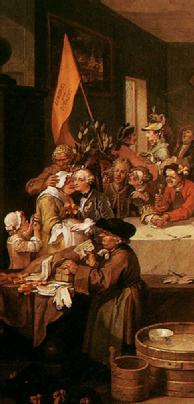Connections, Convergences and Disjuncture - Britain and the Birth of British America 1700-1750
RATIONALE
The first half of the eighteenth century is a period of great importance in the histories of Britain (established by the union between England and Scotland in 1707), British America (increasingly important as the century progressed), the British Empire (undergoing significant transformations despite metropolitan indifference) and the Atlantic World (a world that can be seen as increasingly integrated during this period). This workshop seeks to examine the underlying historiographical paradigms that have shaped historians’ understanding of this period, both for the study of British history and culture and also for British America. What is remarkable is how long-lasting and relatively uncontested they have been. For a generation, our understanding of the development of eighteenth century Britain has been largely shaped by the idea that Britain developed into a fiscal-military state following the Glorious Revolution and the associated financial revolution of the 1690s and 1700s. That understanding has itself been influenced by two paradigms of even longer standing, the notion that Britain moved from chronic political instability in the seventeenth century to remarkable political stability, accompanied and facilitated by a developing sense of politeness engendered through participation in a distinctive public sphere. Our understanding of early eighteenth century British America has also been shaped by paradigms of long standing. In particular, the growth, development and remarkable social, demographic and economic successes of British America after 1720 have been considered within the concept of an Anglicising society and in an imperial context in which “salutary neglect” still plays an important role.
PROGRAMME
This workshop, held on 25th march 2011, examined whether some of these long-standing paradigms – often dismissed as inadequate but not yet replaced by other models with more explanatory power– needed to be updated, reinvented, restored or retired. Among a variety of themes that were explored were the fiscal-military state, the growth of political stability, the eighteenth century urban renaissance, politeness and the public sphere, demographic transitions, slavery, the integration of a British Atlantic world, parliament and popular politics, class and deference, monarchy and republicanism and the early Enlightenment. This workshop followed on from a successful workshop held at the Newberry Library 5 November 2010 and is part of a large project on the histories and historiographies of Britain and British America from the mid-seventeenth to the mid-eighteenth centuries called “Connections, Convergences and Disjunctures: Reconsidering Britain and British America, 1650-1750.” Full workshop report here
WORKSHOP ON 25 MARCH 2011
VENUE: Lecture Room 4, Arden House, University of Warwick
TIMETABLE
10.00 Coffee
10.20-.10.30 Introduction: Mark Knights (Warwick) and Trevor Burnard (Warwick/Melbourne)
10.30-12 Convergence and Divergence in British and British American Historiography 1700-1750: discussion led by Trevor Burnard and Simon Middleton (Sheffield). You can find suggested reading by clicking here
12-12.10 short break
12.10-1.15 Literature and Culture in Britain and British America: discussion led by Eric Slauter (Chicago) and Mark Knights. You can find suggested reading by clicking here
1.15-2.15 Lunch
2.15-3.30 Stable Societies? Session 1: Political Economy. Discussion led by Nuala Zahedieh (Edinburgh) and Will Pettigrew (Kent). You can find suggested reading by clicking here
short break
3.35-4.45 Stable Societies? Session 2: Discussion led by Brendan Simms (Cambridge) and Steve Pincus (Yale). You can find suggested reading by clicking here
4.45-5 Concluding remarks: Trevor Burnard and Mark Knights
5-6 Wine Reception
Future activities include a two-week residential workshop to be held at the Newberry Library 10-23 July 2011.

